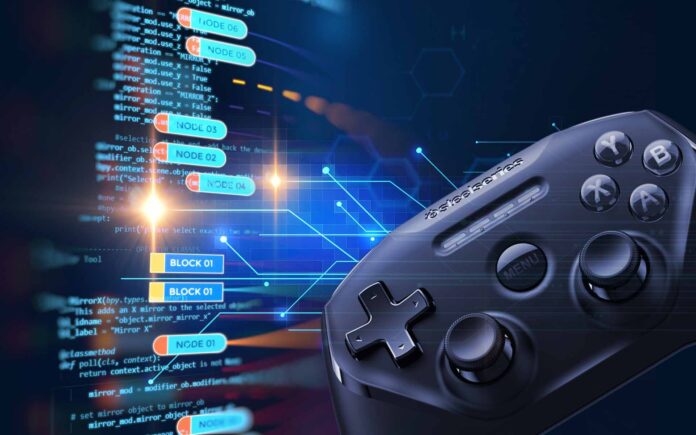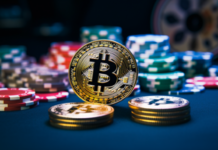
Crypto, Bitcoin or blockchain-based gaming is the next frontier of gaming. Amateur and professional developers alike are working to leverage this new technology and deliver superior gaming experiences.
But crypto and Bitcoin gaming’s horizons are limitless.
Today, crypto gaming represents 52% of all blockchain activity and is one of the fastest-growing niches within this sector. But what is the point of Bitcoin gaming and how does it work?
What is Crypto Gaming?

Traditional games are centralized by nature. The developer creates a world, missions, characters, skins, and more, all coded into a game. Nothing that comes from one game can be used in another game without building it from scratch again.
Crypto gaming is essentially open-source gaming in action. Anyone associated with the game is allowed to own a part of the game. In theory, anyone can construct their own creations and bring them into the game.
Users can take their own characters, rewards and purchases to transfer into another game. While this is the framework behind crypto gaming, developers can still place limits on their creations.
Can Crypto Gaming Apply to Multiple Sectors?
The beauty of crypto gaming is that it’s powered by the blockchain. Crypto is the currency that features within the gameplay, but it’s not the heart and soul of how these games operate. The presence of the blockchain alone is what offers newfound freedom to the industry.
Today, the most popular blockchain game is Alien Worlds, with a registered 196,700 users. This indicates that the sector still has a long way to go, as developers explore avenues for how to exploit it.
Blockchain’s benefits can apply to practically every sector, including traditional games, Play-to-Earn (P2E) games, and even online casinos.
How Does Crypto Gaming Actually Work?

All digital assets within traditional games are owned by the original developers. With a crypto game, the original development team builds the framework and allows its users to own and acquire items as the game progresses.
The most prominent example of this principle in action is NFTs. Players can create NFTs within their favorite games and own them. In theory, they can also buy and sell these player-created items, essentially creating an in-game economy that’s unstructured and separate from the development team.
Blockchain gaming is developed on blockchain networks, giving all connected devices access to every piece of information. Decentralized information control gives equal power to creators and ordinary players alike.
Blockchain technology has two purposes for developers. Development teams can create entire games within the blockchain or use it to implement in-game technology. If creating an entire game on the blockchain, every in-game interaction is recorded and stored as blocks in the blockchain. In the latter case, NFTs form the benchmark for in-game digital assets.
The real-money gaming niche has pioneered crypto gaming, providing a safer and more secure gaming experience. For example, casinos such as Metaspins actively use blockchain technology to boost reward potential and create a fast-paced, exciting gaming experience for all.
In other words, crypto gaming is just as connected to virtual assets as it is to a currency with real-world value.
Enhancing Security for Players

The casino gaming industry has also taken notice of how cryptocurrency can be used to enhance the player experience.
Crypto-powered casinos leverage the blockchain to enhance security for players. They provide a fairer gaming experience by generating unique encryption keys for every outcome. After the event has occurred, connected players can access another key, confirming that the outcome was random and fair.
Blockchain technology also decentralizes information to overcome the issue of a single point of failure. It addresses the issue of a data vulnerability, reducing the threat posed by hackers looking to steal personal information.
Transactions using these currencies are not backed by a centralized party, making them more susceptible to theft and damage from malicious actors. It is highly recommended that gamers use a wallet with two-factor authentication and other protective measures while playing games with a cryptocurrency.
Additionally, the game’s rules should be thoroughly read before starting in order to ensure that the terms of service are fair and protect the player’s assets. Furthermore, gamers should take advantage of reputable exchanges that have their own security protocols in place when buying or selling crypto assets.
Finally, gamers should be aware of the potential for scammers who can easily hide behind a fake persona or account name. By understanding these security considerations, gamers will be able to enjoy playing games with cryptocurrency with peace of mind.
How Can Players Make Money From Crypto Gaming?

Crypto gaming’s decentralized structure has led to opportunities for players to create a self-sustaining economy. It has also opened up the light and dark sides of the crypto world for players worldwide.
In-game digital assets can represent anything from real estate to artwork. Ownership of an NFT is proof that you own a particular asset.
Digital assets can be bought and sold on the open market for cryptocurrency, but it’s not the only way players can make money. P2E games provide cryptocurrency as rewards, with Bitcoin being the most common token used.
However, crypto games can operate using practically any token, such as Ethereum or Ripple.
What is the Future of Crypto Gaming?
Crypto gaming is the future. Although Bitcoin may not be the pioneering token in the future, the value within these games is blockchain technology.
Many people are unaware of how many areas of life the blockchain is set to disrupt. Already, sectors ranging from banking to video games have started to explore how blockchain technology can enhance the end-user experience.
With that in mind, blockchain-based gaming remains in its infancy. There’s a long way to go before it achieves mainstream adoption, which will require significant investment from legacy gaming developers and operators.
What do you think the future holds for crypto gaming?











